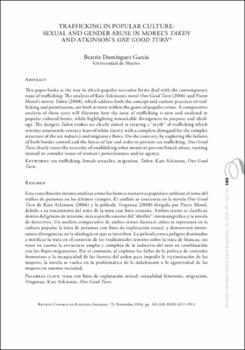Trafficking in Popular Culture: Sexual and Gender Abuse in Morel’s Taken and Atkinson’s One Good Turn
Author
Domínguez García, BeatrizDate
2016Abstract
Esta contribución intenta analizar cómo las formas narrativas populares utilizan el tema del tráfico de personas en los últimos tiempos. El análisis se concentra en la novela One Good Turn de Kate Atkinson (2006) y la película Venganza (2008) dirigida por Pierre Morel, debido a su tratamiento del tema de la trata con fines sexuales. Ambos textos se clasifican dentro del género de misterio, más específicamente del “thriller” cinematográfico y la novela de detectives. Un análisis comparativo de ambos textos ilustrará cómo se representa en la cultura popular la trata de personas con fines de explotación sexual, y demostrará interesantes divergencias en la ideología en que se inscriben. La película evoca peligros destinados a mitificar la trata en el contexto de los tradicionales temores sobre la trata de blancas, sin tener en cuenta la estructura amplia y compleja de la industria del sexo en combinación con los flujos migratorios. Por el contrario, al explorar los fallos de la política de controles fronterizos y la incapacidad de las fuerzas del orden para impedir la victimización de las mujeres, la novela se vuelca en la problemática de la indefensión o la agentividad de las mujeres en nuestra sociedad. This paper looks at the way in which popular narrative forms deal with the contemporary issue of trafficking. The analysis of Kate Atkinson’s novel One Good Turn (2006) and Pierre Morel’s movie Taken (2008), which address both the concept and current practices of trafficking and prostitution, are both written within the genre of popular crime. A comparative analysis of these texts will illustrate how the issue of trafficking is seen and analysed in popular cultural forms, while highlighting remarkable divergences in purpose and ideology.
The dangers Taken evokes are clearly aimed at creating a “myth” of trafficking which rewrites nineteenth-century fears of white slavery with a complete disregard for the complex structure of the sex industry and migratory flows. On the contrary, by exploring the failures of both border control and the forces of law and order to prevent sex trafficking, One Good Turn clearly states the necessity of establishing other means to prevent female abuse, turning instead to consider issues of women’s powerlessness and/or agency.





